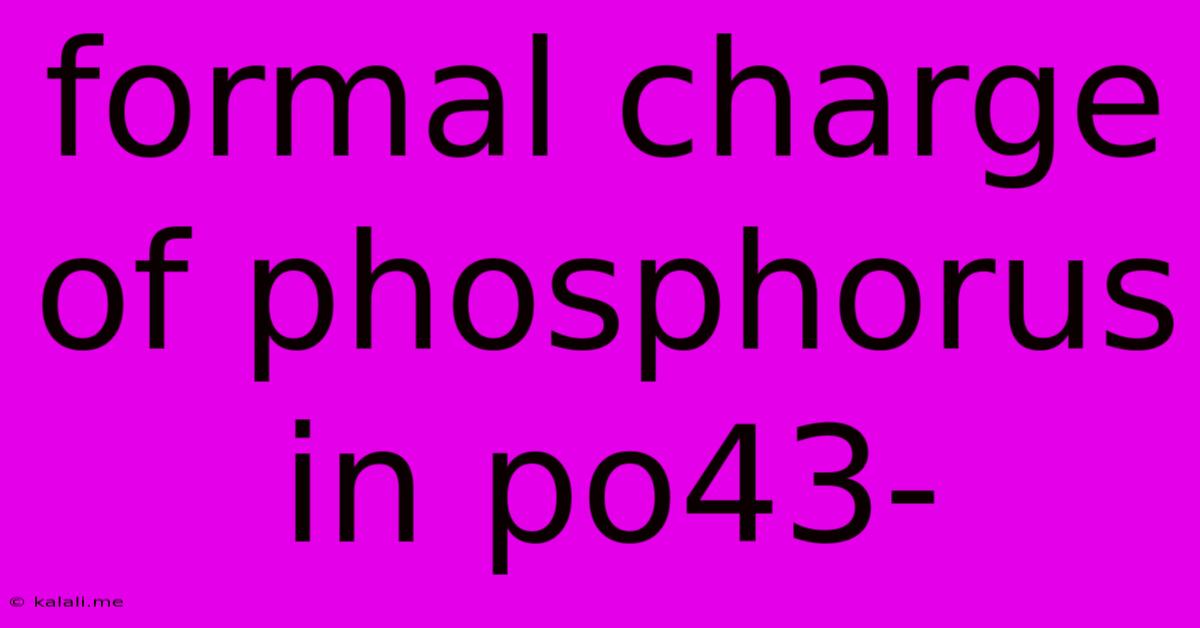Formal Charge Of Phosphorus In Po43-
Kalali
Jun 14, 2025 · 2 min read

Table of Contents
Determining the Formal Charge of Phosphorus in PO₄³⁻
Understanding the formal charge of atoms within a molecule or ion is crucial for predicting its structure and reactivity. This article will delve into the process of calculating the formal charge of phosphorus (P) in the phosphate ion (PO₄³⁻), a common polyatomic anion found in many biological and chemical systems. This will involve understanding valence electrons, bonding electrons, and non-bonding electrons.
The phosphate ion, PO₄³⁻, is a tetrahedral structure with phosphorus at the center and four oxygen atoms surrounding it. To determine the formal charge of phosphorus, we'll use the following formula:
Formal Charge = (Valence Electrons) - (Non-bonding Electrons) - (1/2 x Bonding Electrons)
Let's break down the calculation step-by-step:
1. Valence Electrons of Phosphorus
Phosphorus (P) is in Group 15 of the periodic table, meaning it has five valence electrons.
2. Bonding Electrons of Phosphorus
In the PO₄³⁻ ion, phosphorus forms four single bonds with each of the four oxygen atoms. Each single bond consists of two electrons, so the total number of bonding electrons for phosphorus is 4 bonds * 2 electrons/bond = 8 bonding electrons.
3. Non-bonding Electrons of Phosphorus
Phosphorus doesn't have any lone pairs (non-bonding electrons) in the PO₄³⁻ ion. Therefore, the number of non-bonding electrons is 0.
4. Calculating the Formal Charge
Now, we can plug these values into the formal charge formula:
Formal Charge = 5 (Valence Electrons) - 0 (Non-bonding Electrons) - (1/2 * 8) (Bonding Electrons) = 5 - 0 - 4 = +1
Therefore, the formal charge of phosphorus in the PO₄³⁻ ion is +1.
Understanding the Result: Resonance Structures and Formal Charge Distribution
It's important to note that the actual charge distribution in PO₄³⁻ is more complex due to resonance. While our calculation shows a +1 formal charge on phosphorus, the negative charge is actually delocalized across the four oxygen atoms. The resonance structures show that each oxygen atom carries a partial negative charge, averaging to -1 per oxygen, thus balancing the +1 charge on phosphorus to produce the overall -3 charge on the ion. The formal charge calculation provides a simplified representation of the electron distribution.
Key Takeaways
- The formal charge is a bookkeeping tool used to assess electron distribution in a molecule.
- The formal charge of phosphorus in PO₄³⁻ is +1 based on the simple calculation.
- Resonance significantly impacts the actual charge distribution, leading to delocalization of the negative charge over the oxygen atoms.
- Understanding formal charge is vital for predicting molecular geometry and reactivity.
This detailed explanation provides a clear understanding of how to calculate the formal charge of phosphorus in the phosphate ion, highlighting the importance of understanding valence electrons, bonding electrons, and the concept of resonance in accurately representing molecular structure and charge distribution. Remember to always consider resonance when analyzing complex ions such as PO₄³⁻.
Latest Posts
Latest Posts
-
What Is Difference Between Certified And Registered Mail
Jun 14, 2025
-
Organism Population Community Ecosystem In Order
Jun 14, 2025
-
What Is The Largest Gland In The Human Body
Jun 14, 2025
-
Which Ocean Separates North America From Europe
Jun 14, 2025
-
What Is The Opposite Of Pragmatic
Jun 14, 2025
Related Post
Thank you for visiting our website which covers about Formal Charge Of Phosphorus In Po43- . We hope the information provided has been useful to you. Feel free to contact us if you have any questions or need further assistance. See you next time and don't miss to bookmark.